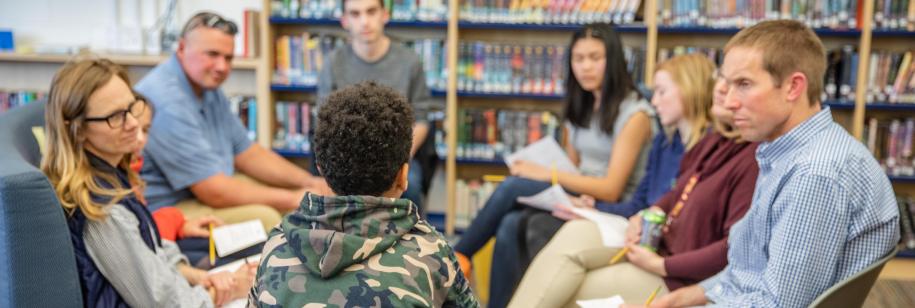
Breadcrumb
- Essential Partners
- Who We Work With
- Middle & High Schools
- Student Leadership
Empowering Students Through Dialogue
Students who are taught to use EP’s dialogue approach are better able to view issues or problems from different perspectives, to collaborate with multiple members of diverse teams, and to practice active listening as well as critical thinking—skills that will serve them as future leaders in an increasingly diverse nation.
Students exposed to EP’s approach learn to facilitate and encourage conversations that build understanding and trust. They come to understand the power of a great question to change the trajectory of a conversation and make new paths forward possible. They learn to recognize the impact that deep listening can have on the strength of a relationship.
“I learned that through productive dialogue, you can make relationships and friendships with people through talking about your differences and similarities,” said one Newburyport High School student. Another student reflected that they understand more about the students around them and feel less alone now because of dialogues held at their high school.
Holding space between differences of views and identities also allows them to practice frustration tolerance and emotional control, bolstering their social-emotional learning.

“Student facilitators flip the script. When students lead, you can see a change occur, a shift as they work to hear and address the needs of their classmates and their community.”
Kimberly Shaw, Associate Dean of Students & EP Associate
The Putney School, Vermont
21st Century Leadership Skills
Diversity and inclusion are not just buzzwords. The ability to navigate diverse perspectives and identities will be key to successful leadership in the 21st Century.
EP’s approach equips students with the tools, experience, and confidence to become community and business leaders in the decades to come. Not only do they build the internal resources to manage differences, they develop emotional intelligence, meeting facilitation capabilities, and strong communication skills.
“Student facilitators flip the script,” said educator and EP Associate Kimberly Shaw. “When students lead, you can see a change occur, a shift as they work to hear and address the needs of their classmates and their community.”
EP’s approach also gives students skills that are crucial to a flourishing democratic society: the ability to facilitate difficult discussions, to manage differences of views, and to find common purpose in the midst of clashing values.
“When a debate occurs, you never feel like you get to hear a person’s full point of view,” explains Vibhav Nandagiri ’21, a newly-trained dialogue facilitator. “But, through dialogue, you get to learn someone else’s perspective without any competitive need to win an argument. It leads to mutual understanding; listening to each other helps us chip away at our differences.”
EP-trained students have led dialogue about issues like race and racism, mental health during the pandemic, and school policies. They have brought their newfound skills to their roles in club sports, community engagements, and city hall. When we teach students to lead, we ensure the future will have the leaders we need.
When you're ready to take steps to transform your school, reach out for a free consultation.
